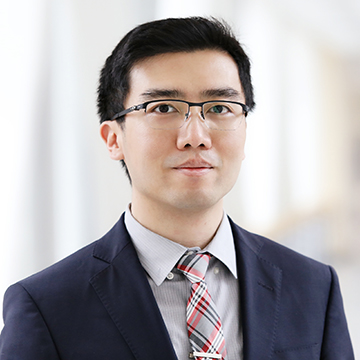Northwestern’s Yuan Luo Awarded Prestigious Informatics Award
Yuan Luo, PhD, associate professor of Preventive Medicine in the Division of Health and Biomedical Informatics, has been awarded the AMIA 2020 New Investigator Award.
The American Medical Informatics Association (AMIA), the leading professional association for biomedical and health informatics professionals, will honor Luo during its 2020 Virtual Awards Gala on Sunday, November 15.
“Dr. Luo is the archetype of a rising star in clinical research informatics,” says James Cimino, MD, director of the Informatics Institute at the University of Alabama-Birmingham. “He has coupled interdisciplinary training from leaders in the field with original creativity and amazing energy. I don’t expect this to be his last AMIA signature award.”
The New Investigator Award recognizes an individual for early informatics contributions and significant scholarly contributions based on scientific merit and research excellence.
“Being honored in this way by AMIA illustrates the impact of our research and its promise in advancing the field of informatics,” says Luo. “I am in debt to so many mentors, colleagues, and students who I have had the pleasure to work with. They have believed in my vision, and we have worked together to achieve success.”

Being honored in this way by AMIA illustrates the impact of our research and its promise in advancing the field of informatics. I am in debt to so many mentors, colleagues, and students who I have had the pleasure to work with.”
Luo was nominated by Cimino; Wendy Chapman, PhD, associate dean of Digital Health and Informatics at the University of Melbourne, Australia; Isaac Kohane, MD, PhD, the Marion V. Nelson Professor and Chair of Biomedical Informatics at Harvard Medical School; Philip Payne, PhD, director of the Institute for Informatics at Washington University in St. Louis; Justin Starren, MD, PhD, director of the Center for Biomedical Informatics and Data Science at Northwestern University; and Peter Szolovits, PhD, professor of Computer Science and Engineering and Health Sciences and Technology at the Massachusetts Institute of Technology.
“One of the more underrated but important skills that Yuan possesses is his ability to seek out mentorship,” says Chapman. “I was not directly involved in his recent research, but since he was a student, he has often kept me updated on progress and has sought my advice.”
Luo completed his PhD at MIT in 2015 and accepted a faculty position at Northwestern University Feinberg School of Medicine’s Department of Preventive Medicine the same year.
During his doctoral training, Luo fostered an ability to develop productive research collaborations and his thesis won the inaugural AMIA Doctoral Dissertation Award Honorable Mention. According to Google Scholar, Luo’s research has received more than 2,000 citations by scientists from nearly 30 countries.
In 2019, Luo was named Chief AI Officer at the Northwestern University Clinical and Translational Sciences (NUCATS) Institute and at the Institute of Augmented Intelligence in Medicine (I.AIM).
“Working in informatics provides an opportunity to reach out and work closely with researchers with diverse backgrounds,” says Luo. “Some of my closest academic colleagues are machine learning researchers, pathologists, oncologists, and cardiologists from universities across the country. These broad collaborations have benefited me with perspectives from different biomedical subdomains, and motivated me to develop methods that translate science and engineering into medicine.”
Luo’s research interests include machine learning, natural language processing, time series analysis, integrative genomic analysis, and big data analytics, with a focus on medical and clinical applications. A recent study co-authored by Luo and published in Nature Medicine, showed how a novel precision medicine approach enhanced by artificial intelligence could help produce the first biomedical screening and intervention tool for a subtype of autism. The research gained international attention, and Luo is hopeful that it can facilitate evidence-based, personalized therapies that inform future clinical trials.
“Yuan might be best described as a true data scientist, and we are lucky to have him at Northwestern,” says Starren. “He continues to develop an innovative suite of computational methods for machine learning, and possesses a unique breadth of expertise that spans structured EHR data, unstructured clinical notes, medical imaging, and integrative genomics. I am confident that he will continue to be a leader in the biomedical informatics community for years to come.”
Written by Roger Anderson




